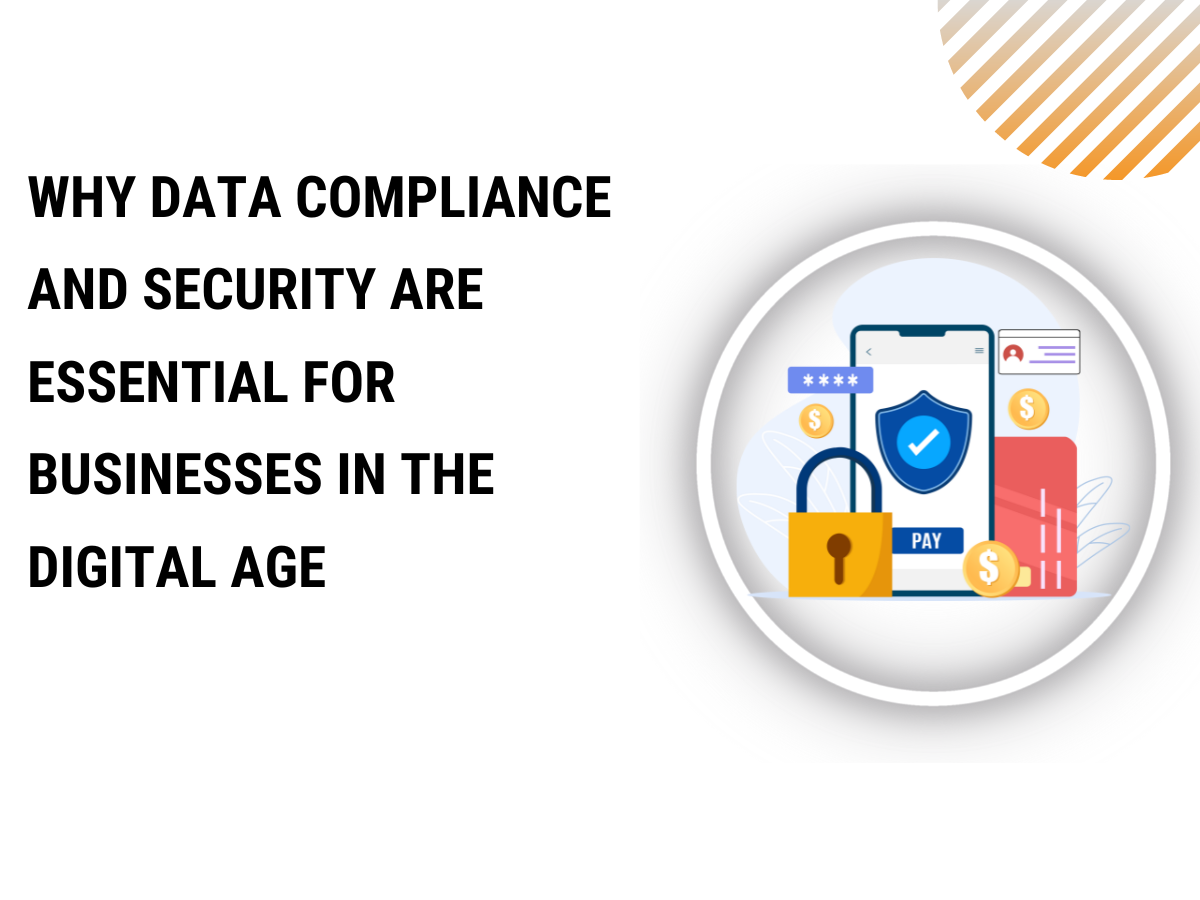In today’s digital age, businesses face several challenges, and data maintenance and security are one. Data is one of the most valuable assets of any company and should be protected with encryption.
Businesses need to ensure data compliance and security to protect their sensitive information. Failing to prioritize data compliance and security risk results in financial and reputational damage and legal consequences.
In this blog, we will explore why data compliance and security are essential for businesses and what measures they can take to ensure they meet compliance requirements.
- Ensures Compliance with Relevant Regulations
- Protection from Security Breaches
- Streamlines Business Continuity
- Access Control
- Give a Competitive Advantage
- Provides Intellectual Property Protection
- Security of Mobile Devices
- Reduces Financial Risks
- Follow Governance Regulations and Frameworks
Let’s dive into the details of each so that you have a better understanding of them:
1. Ensures Compliance with Relevant Regulations
There are several regulations and laws that businesses need to comply with concerning data privacy and security. In addition, compliance regulations are set regarding the industry and the organization.
These regulations vary geographically according to the types of data any organization handles. For instance, businesses that collect and store social security information must comply with social security and privacy regulations.
Likewise, organizations that operate in the healthcare industry must adhere to HIPAA regulations, while those that deal with financial information must follow GLBA and PCI DSS regulations.
Failure to comply with relevant regulations can cause hefty fines and legal action, damaging the organization’s reputation and finances.
Compliance with relevant regulations is a critical aspect of data compliance and security. Failure to comply with these regulations can cause significant legal consequences, including fines, legal action, and reputational damage.
Businesses must ensure that they meet all relevant compliance requirements, including protection and privacy regulations. Businesses can reduce regulatory risks and protect their sensitive information by prioritizing compliance with laws.
2. Protection from Security Breaches
Security breaches are among the most significant risks to businesses in the digital age. According to recent statistics, 2,200 cyber attacks were reported daily, which means one attack was reported around every 39 seconds.
With such prevalence, it becomes quite essential for companies to focus on data compliance and security. A security breach puts your sensitive information, including client data, intellectual property, and financial information, at stake.
This lack of data security can severely damage your company’s financial health and reputation. You may also face loss of customer trust and legal consequences due to a breach of confidential information.
Specific protection laws protect sensitive information for any sensitive data held by a company. Failure to comply with these protection laws can cause significant legal, financial, and reputational damage to any company.
Businesses can now enhance their market value by reducing the chances of security breaches by employing secure archiving software. You can back up your data safely according to protection laws and compliance regulations.
This can reduce the risk of losing legal and financial data while protecting their customers’ sensitive information.
3. Streamlines Business Continuity
Data compliance and security are essential for streamlined business continuity. If your business is at high risk for security breaches and data loss, you must maintain your data security properly.
Cyber attacks and security breaches greatly hinder a business’s daily business processes. Because of significant disruptions and data loss, companies may face operational hindrances.
Ultimately, this can badly affect the financial health of any organization, resulting in loss of revenue and customer trust. Organizations can ensure data backups by implementing data compliance and security measures.
Timely record backups and file server archiving help maintain contingency plans to minimize disruption of business processes.
In addition, data compliance and security are crucial for digitally active businesses with remote work to ensure business continuity.
Businesses can now combat significant issues, including bankruptcy and legal complications, by ensuring data compliance and security.
With competent data compliance and security software, businesses can avoid any data breach that disrupts business operations. This ensures smooth business continuity and reduces any potential risks of security breaches.
4. Access Control
If your sensitive and confidential data is openly available to access from your systems, it can significantly reduce the integrity of your data.
Few records are supposed to be publically available, and open access to sensitive files can evoke legal action due to security breaches.
Depending on the industry, there are different layers to maintaining data compliance and security to ensure smooth business operations.
In this digital age, where almost everything is available online, you must preserve certain information that can harm your market value and reputation.
For example, if your customer data or client information is leaked, it can lower your trustworthiness.
Through taking measures like access control and monitoring activity, businesses can easily protect their sensitive information from unwanted intruders.
This access control can be set for human and robotic access to ensure no malware bug or human can access sensitive records.
Through other vital practices such as passwords, two-factor authentication, and end-to-end encryption, you can now work on policies for solid access control.
By accessing control using security technologies such as cloud software, your business can protect its sensitive information from security threats.
Using file server archiving and 256-AES encryption, you can store your data for a long time without the risk of security breaches.
5. Give a Competitive Advantage
What’s more important than maintaining a good reputation in the market and among consumers? First, your company’s reputation directly relates to your profitability.
Customers are increasingly concerned about data privacy and security. As a result, businesses that can show their commitment to protecting sensitive information are more likely to win their trust.
If you want to ensure that you are not a company that is not falling behind competitors, you need to focus on the latest technologies to prevent security issues.
Whatever data you store on your systems has a high risk of a security breach if your plans are not secured using compliance regulations. Your data compliance and security measures can be controlled through online cloud software.
Businesses can differentiate themselves from their competitors by implementing security solutions and complying with relevant regulations. This also helps businesses to attract customers who value data privacy and security.
6. Provides Intellectual Property Protection
When someone has invented or produced something with the creativity and knowledge of their brain, it is referred to as intellectual property.
If any company is using a custom file server or file management system, it is their product trademarked under their company’s name.
Similarly, any sensitive records, logos, taglines, and images that any company solely produces for their brand are trademarked according to copyright law. If anyone else tried to steal such intellectual property, they would have to suffer penalties and heavy fines.
Businesses that fail to protect their intellectual property risk losing their competitive advantage and revenue streams. Organizations can protect their intellectual property from unauthorized access or theft by implementing data compliance and security measures.
Data compliance and security software critically overlook all business processes and protect intellectual property from risks like cyber crimes and phishing attacks.
Through advanced data compliance and security measures like SSL technology, businesses can reduce the risk of intellectual property theft and protect their competitive advantage.
7. Security of Mobile Devices
In today’s mobile-first world, many organizations allow employees to use their personal devices for work-related tasks. However, this can pose a significant risk to data compliance and security.
Personal devices may not have the same security measures in place as company-owned devices, making them more vulnerable to security breaches.
Organizations can reduce the risk of data loss or security breaches by implementing policies and measures to ensure mobile devices are secure.
This strategy ensures all the compliance and security regulations are appropriately implemented to establish a fool-proof security system.
As a result, companies can now safely move towards the digital transformation of their brand without the risk of losing important files, records, and media files.
This is also great for organizations that work remotely and have their employees linked to their data externally. However, organizations need to ensure their company’s sensitive information is not openly available.
Dishonest employees, especially those working in more prominent positions, can leak your company’s sensitive information leading to insufferable loss.
Around 60-67% of the data breaches result from an incompetent employee who exposed the credentials and essential data of the organization.
Therefore, to reduce the risk of security breaches, companies can now introduce data compliance and security practices to their company and reduce the risk of data loss.
8. Reduces Financial Risks
If an organization is not taking effective data compliance and security measures, it can put the organization at significant financial risk.
With security breaches and data loss, companies can also face financial setbacks, including fines, legal fees, remediation costs, and recovery revenue.
All of this can result in the loss of a significant portion of your safe cash, making it hard to stay afloat in the cut-throat market.
According to a report by IBM (2022), the average calculated cost for a data breach was USD 4.82 million. At the same time, the average per-record cost being compromised was recorded at an all-time high of USD 164.
All these statistics show what loss a company would bear without authentic data compliance and security practice in place.
Significant financial risks, including legal fines, lawsuits, and investigation fees, can also heavily affect the financial health of the organization.
For instance, organizations that fail to comply with the Health Insurance Portability and Accountability Act (HIPAA) in the United States can face fines of up to $1.5 million per violation.
Customers are highly reluctant to do business with companies with a history of compromised data security and breaches. This can reduce your profitability and reputation among customers.
By investing in security solutions such as disaster recovery optimization, implementing access controls, and complying with relevant regulations, businesses can reduce the risk of reputational and financial damage.
9. Follow Governance Regulations and Frameworks
Data compliance and security are essential for organizations that rely on third-party service providers or operate in complex governance frameworks.
Companies working in complex governance frameworks may need to follow specific rules and regulations. Similarly, third-party service providers may require open access to your organization’s private data to perform business processes.
In both cases, it is vital for the organization to have data compliance and security regulation to ensure data is saved from cyber attacks. Organizations need to ensure they are meeting all the data compliance and security regulatory guidelines.
Government frameworks or procedures are planned to enhance business decision-making. A framework of governance laws and jurisdictions allows companies to navigate through regulatory restrictions.
Similarly, third-party service providers can pose significant risks to organizations. These service providers may be best to manage your IT or HR services, but they can hinder your data compliance at security.
The TakeAway
It is essential for businesses of all sizes to ensure data compliance and security. In this digital age, it is more than essential to use the latest technologies to prevent your sensitive information from cyber-attacks.
Businesses can use reliable data security software of ShareArchiver to ensure regulatory compliance and security. Our software uses the best practices to store your data securely which also follows the latest regulatory protocols. Explore our software today and implement the best data compliance and security practices for your business.

















